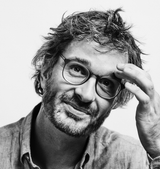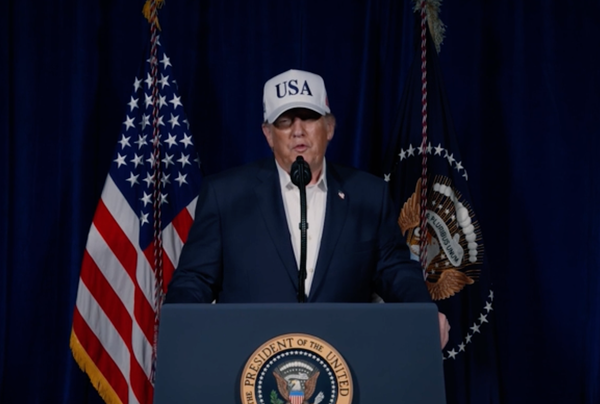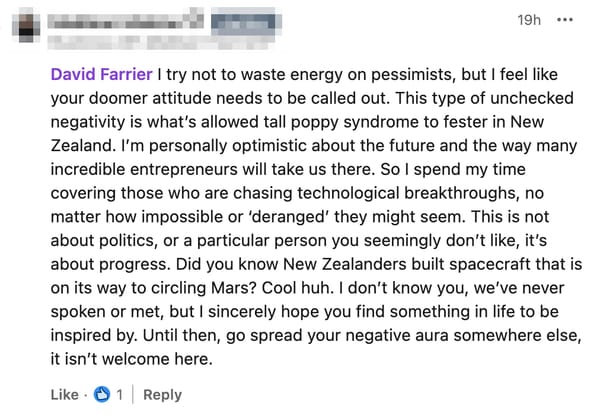The Meaning of a Photograph
How do we find meaning when we can’t agree on the words?
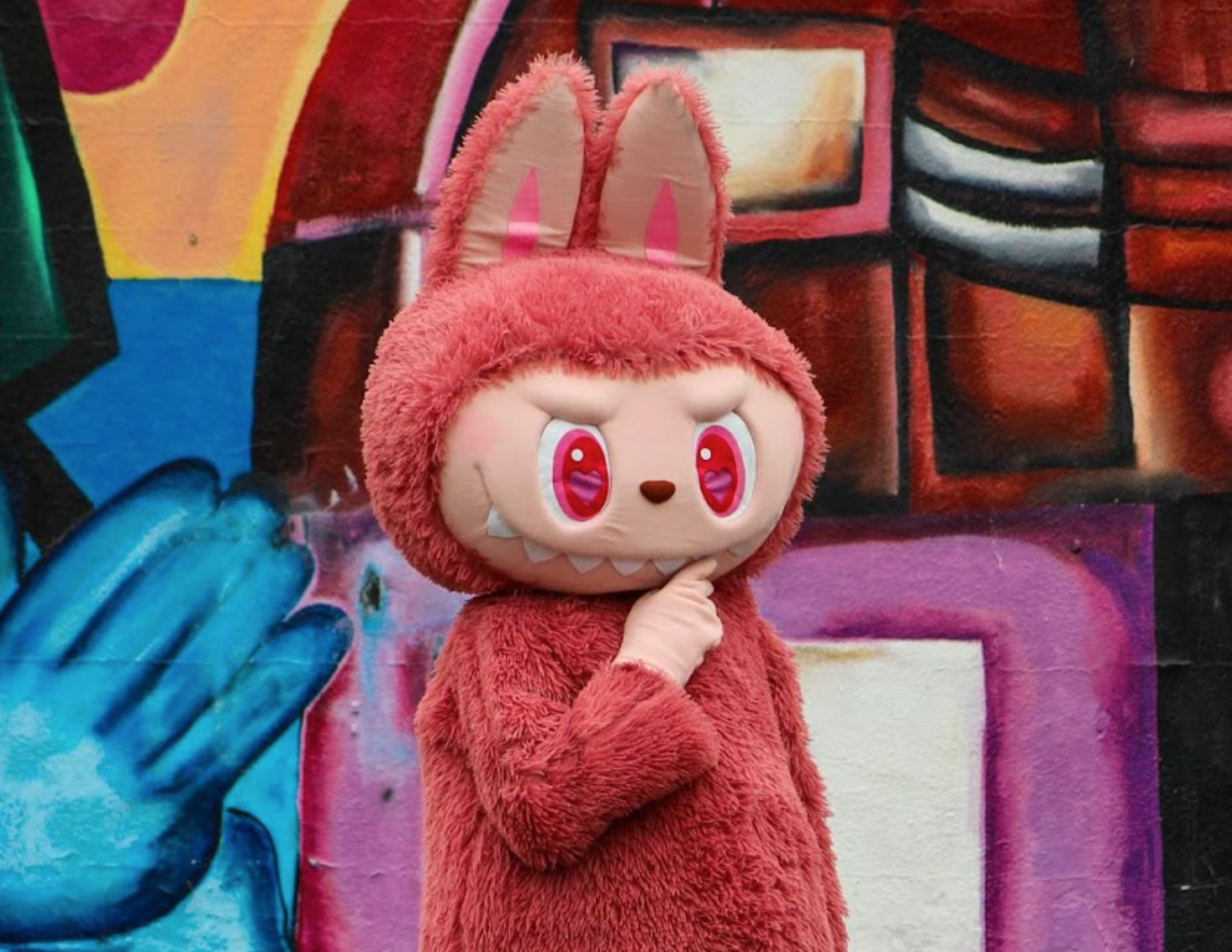
Recent pieces for full Webworm members: I reflect on the nightmare surgeon I met in 2023, and at the horror of police here in 2025. Joshua Drummond attends the "Disruptors' Dinner", and Tony Stamp marvels at the art of a good GIF.
Hi,
Thanks for the spirited discussion under The Horror of Police. Scott got to the heart of it in his comment:
"The problem of New Zealand Police comes in the forces that created it, and the forces that sustain it. Let's not beat about the bush, as the police once did: They were established as part of a platform to disempower and repress Māori. One of their first roles was hunting Māori who had offended the crown."
Wherever you are in the world, substitute "Māori" with whoever lived on the land first, and you start to get the idea.
Now back in October – as I was taking some crude snaps of the LAPD on my phone – I bumped into writer and photographer Eric Langberg, who noticed Pedro Pascal in the crowd when I certainly didn't (you know, faceblind).
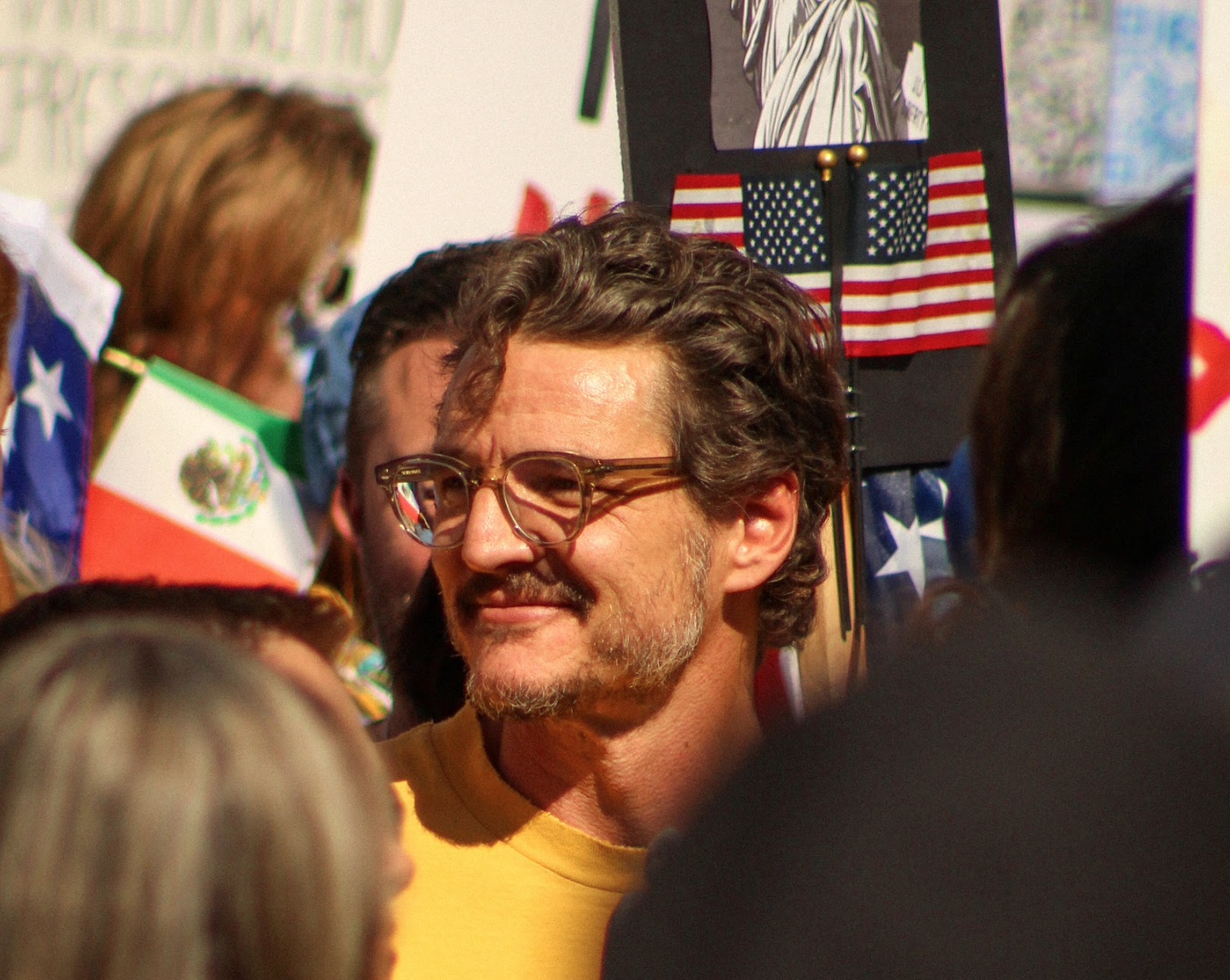
I'd seen Eric's photos regularly going viral on Reddit, and we briefly spoke about his frustration in how his photos were being interpreted online. Rather – how they were being misinterpreted.
In his words:
"I've come to believe that we are experiencing a massive breakdown in the way humans process communication, a disruption in our understanding of the very act of meaning-making."
I couldn't get our conversation out of my head, and so asked him to expand on it for Webworm. I'm really glad to have his piece here today. And what Eric's talking about – it's not just limited to the USA. I think you'll see echoes of what he's discussing wherever you hang out in the world, and online.
Essentially, there is a growing disconnect in people's ability to grasp context – and when you throw in a splash of bad faith arguments and lack of critical thinking, we land in a pretty bad place.
See you in the comments. I will pass this over to Eric.
David.
Labubus, Middle Fingers & Creeping Fascism: How do we find meaning when we can’t agree on the words?
by Eric Langberg
On June 8th at LA Pride, I photographed a mischievous-looking human-sized Labubu walking around Hollywood.
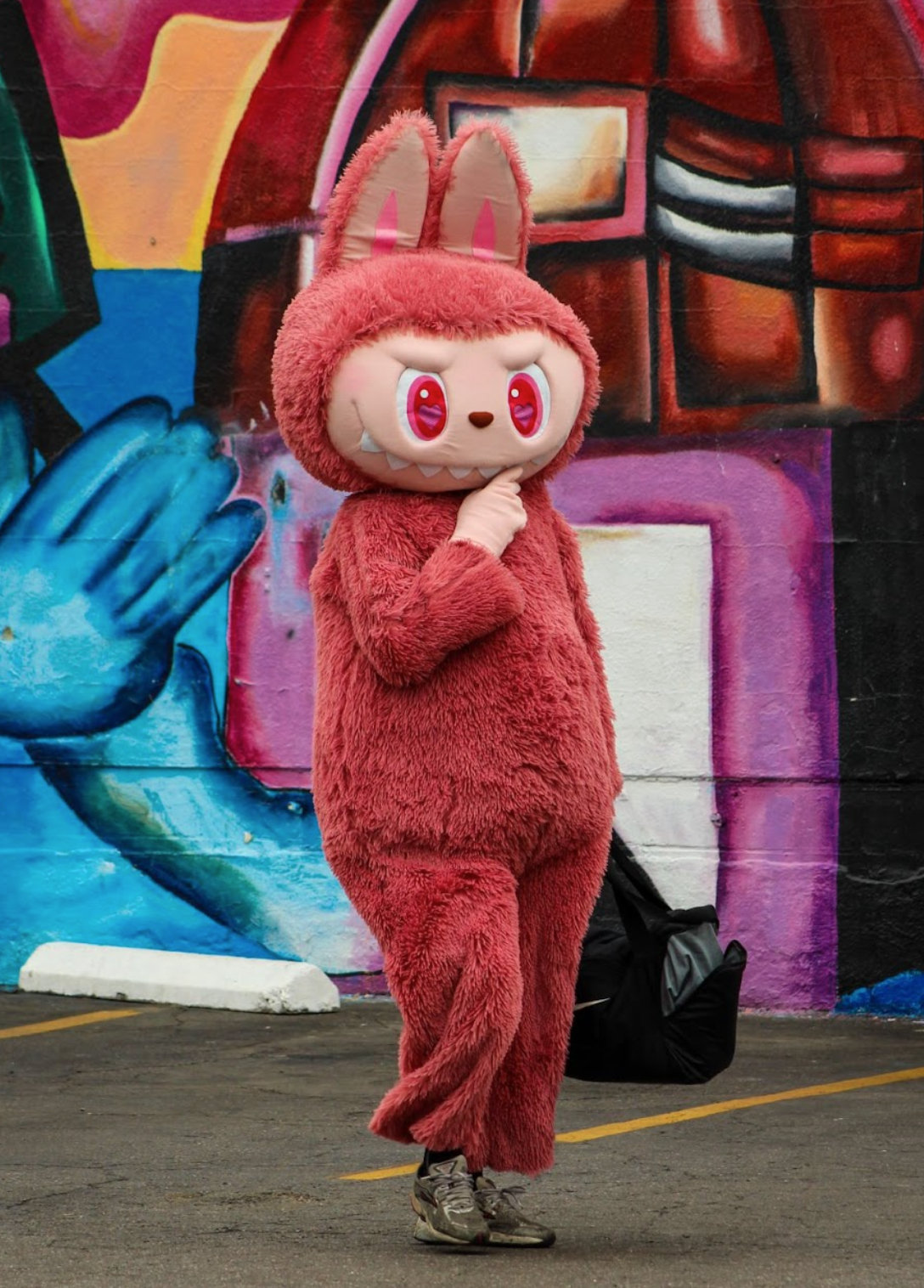
Two days later, on June 10, LA TACO published a photo essay about anti-ICE protests, highlighting that same human-sized Labubu protesting ICE. That day, tensions over proudly-cruel immigration raids downtown had exploded into what the country would call “riots,” leading to some burned-out Waymos, graffiti, a curfew, and the deployment of a staggering variety of armed agents of the state.
I first made it downtown on June 11th – a few days after the human-sized Labubu had appeared – which I will be ashamed of forever.
I found my city crawling with National Guard, ICE, LAPD, Customs and Border Patrol, and Department of Homeland Security officials, some wearing masks and most carrying guns. We’d been invaded. Protesters held press conferences as soldiers watched on. People danced, chanted slogans about “people power,” and yelled profanities.
Then a bored-looking guy in camouflage stretched, and his rifle swept haphazardly across the crowd that had assembled outside the Metropolitan Detention Center.
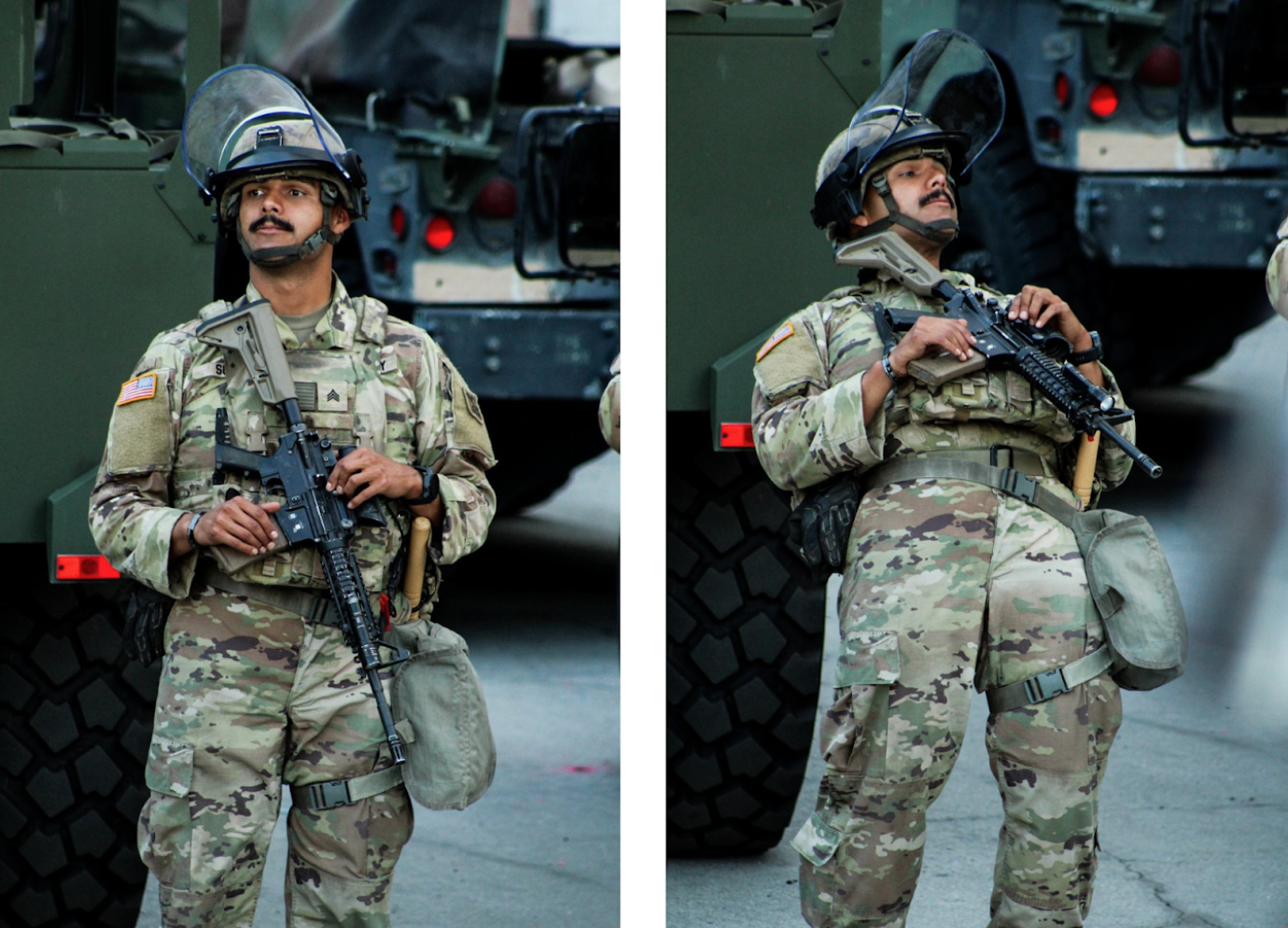
I distinctly remember feeling surprised that my main reaction — to a man dressed like that, lazily waving a gun like that my way — was a sort of clarity. I distinctly remember thinking: “Well, that’s a new life experience, and I guess I’m gonna be photographing this until it’s over, because people need to see.”
Since then, I’ve attended dozens of protests and taken thousands of photos. I’ve shared a bunch on Reddit, where they’ve cumulatively reached something like 42 million views. I say that not to brag. I just mean that I’ve spent months immersing myself in how people online in 2025 respond when they’re shown images of an America coming apart at the seams.
Against my better judgment (and conventional wisdom, and the advice of friends and family concerned about my mental health), I’ve read most of the comments, and I’ve replied to a lot, too. My main takeaway from this year – in LA, in America, and online – is: “Uh oh.”
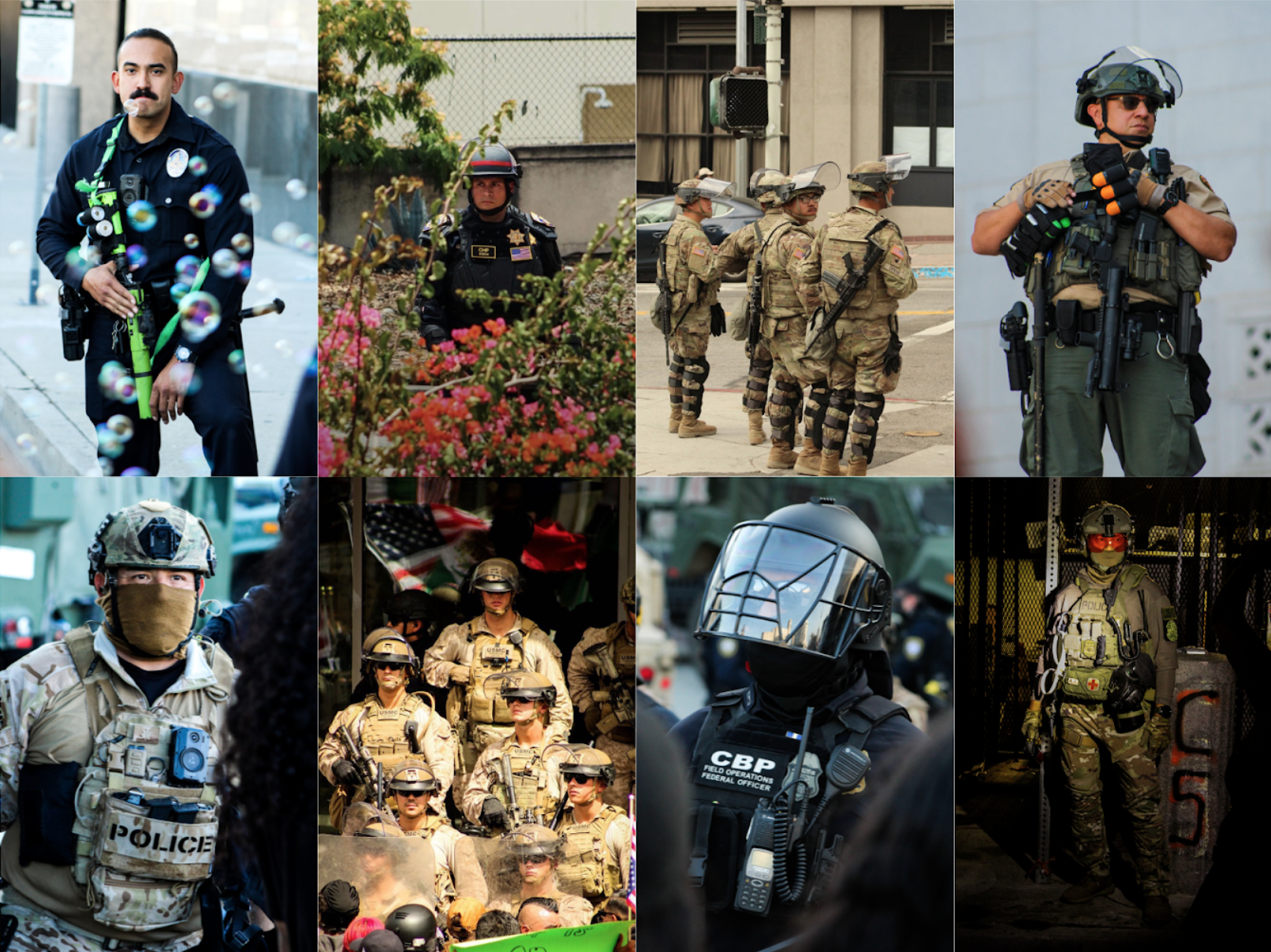
I say “Uh oh” because the conversation online feels completely broken to me – and I think that’s the crack through which fascism has slithered in. It’s happening in the open, but people either aren’t interested or they cannot comprehend. I think it’s because, as a society, we are now either unable or unwilling to engage with images in the way we used to. Pick your cause – TikTok, phones, AI, a decade of a pathological liar ruling or influencing the country and culture, declining literacy rates, increasing bots, 4chan trolls run amok – I’ve come to believe that we are experiencing a massive breakdown in the way humans process communication, a disruption in our understanding of the very act of meaning-making.
Let me explain.
On September 24th, I posted an album called “Day 76 of sustained protest in Downtown Los Angeles, where it’s become an everyday part of life”. Two days earlier, Donald Trump signed an executive order designating anti-fascism as “terrorism.” Three days before that, someone on Reddit said my photos seemed like “surveillance” because I’d posted closeups of protesters. My approach, they said, had them “pissed.”
So, in that “Day 76” album, I didn’t do my normal thing. Instead, I turned my camera on passersby paying no attention to the protesters, who I only depicted this time from behind and through reminders of their presence.
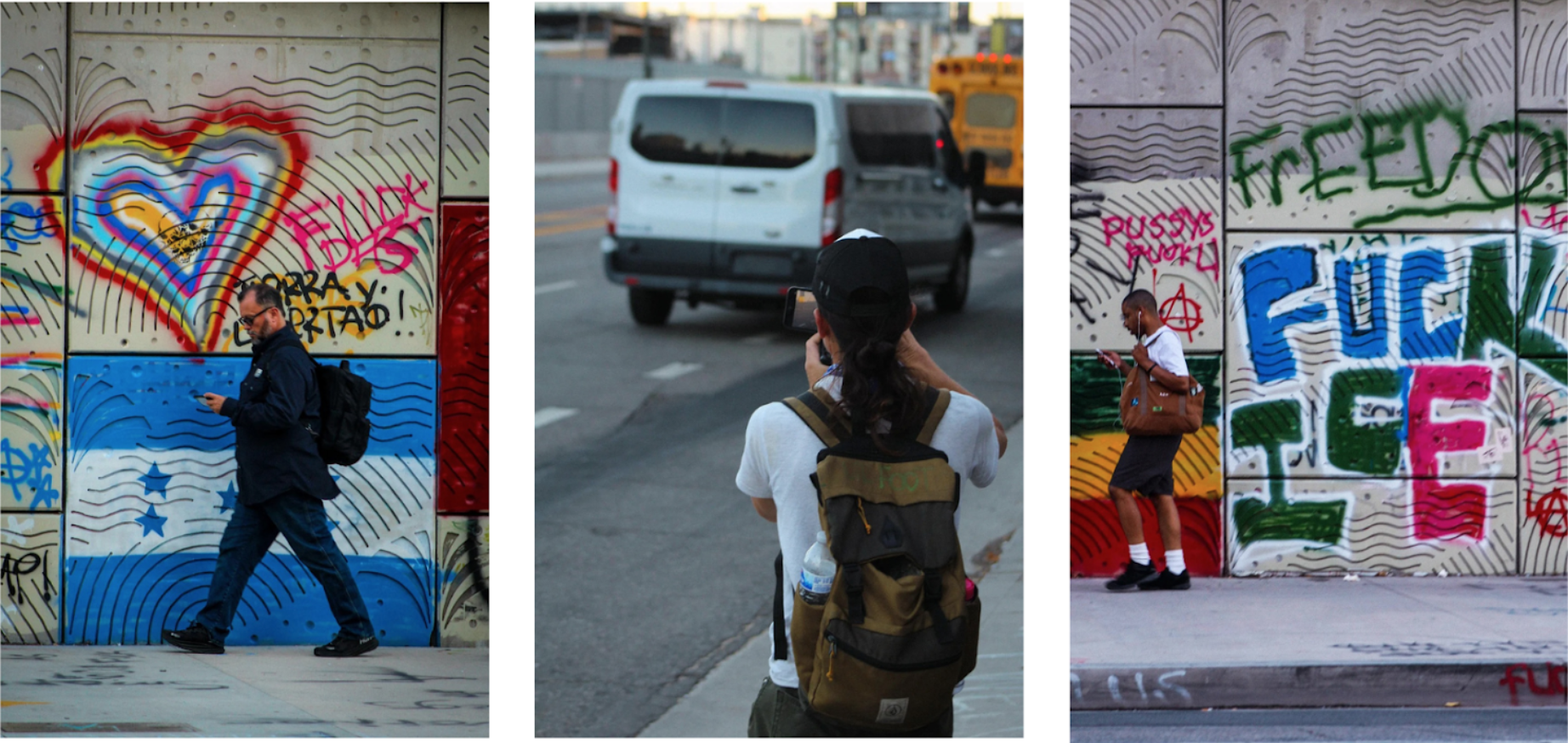
I was surprised when this title made people mad. Everyone seemed to think “Day 76 of protests” meant “76 days’ worth of protest photos,” and they derisively piled on. Where were all the protests I’d promised, hmm? Someone told me it was a misleading title because “that guy on his phone could walk this street everyday so he’s seen it all before.” Fruitlessly, I pointed out that half of the title is “where it’s become an everyday part of life”, but he was not interested in allowing that. He’d interpreted the image the way I’d intended it.
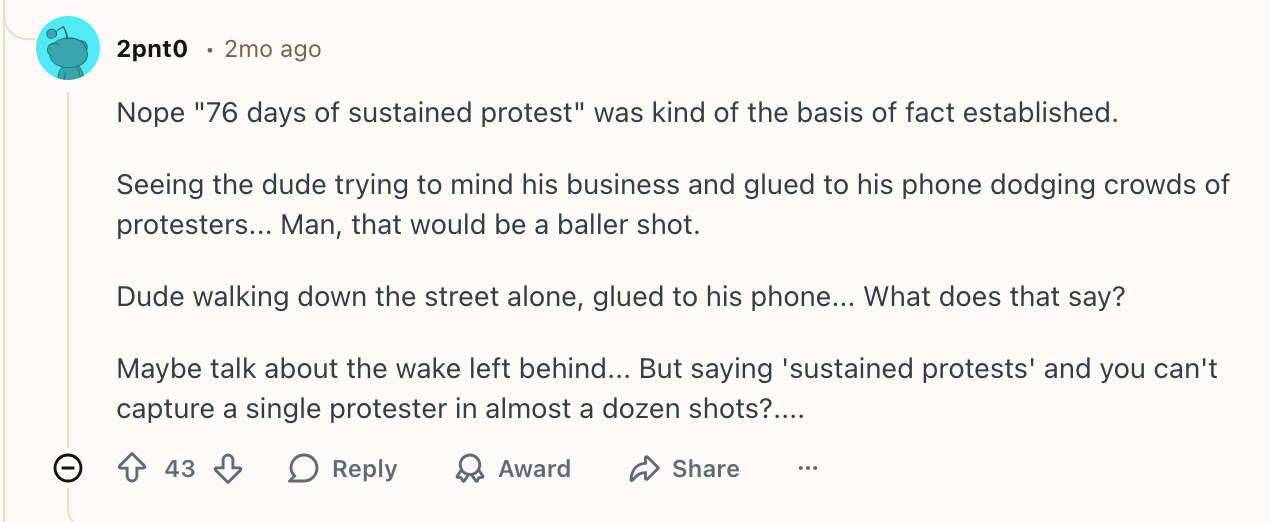
“You can’t capture a single protester?” asked one person. I pointed out that the second photo in the series did, indeed, show a protester.
Here’s what I got:
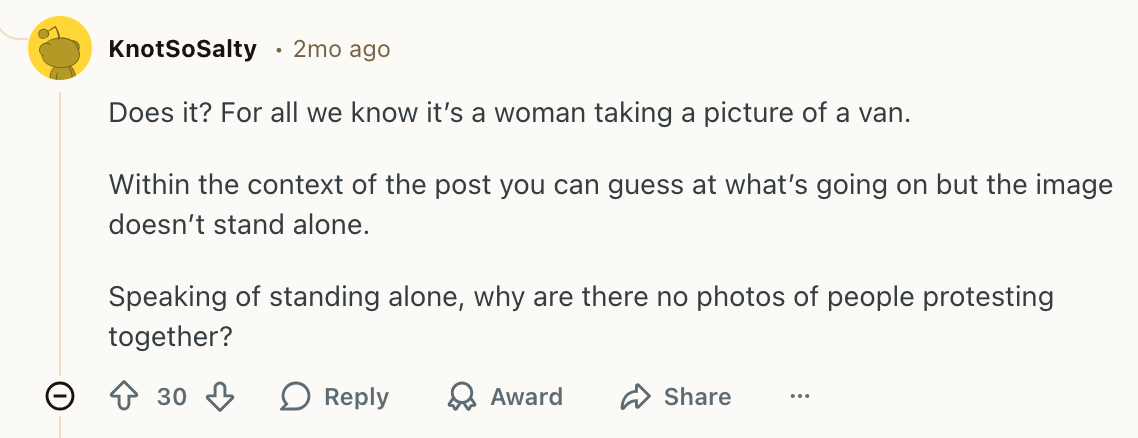
A few things.
- “The image doesn’t stand alone.” – Correct. I know; that’s why I posted it with a title and ten other photos. I am expecting and intending each of those elements to inform your understanding of the others. It drives me nuts that this is maybe the most common criticism of my photos; I find myself trying to explain to people that humans have understood since, well, cave paintings that a succession of images can create meaning not found in any one image. I am exploring the idea of “a series of photos that cumulatively creates meaning” on purpose! It’s not an accident that I want you to look at one to understand the other.
- “For all we know it’s a woman taking a picture of a van.” – I think you actually know a lot more than that! You’ve been told this is Los Angeles, and I’ve told you that this is someone “taking a picture of a van” on the same block as lots of anti-ICE graffiti, and you can see that said van has no license plate, and you’ve been told this person’s taking a picture of a van on the 76th day of protests. At a certain point, I’m aware that you do just have to trust me, but I’m trusting you, too – I’m trusting that you will be able to pull together all those other things you “know” and have them inform how you read this one image.
But we don’t trust each other anymore, and so we’ve started to view everything in isolation, denying that things are connected to one another and that meaning is fundamentally made through this kind of juxtaposition. We’ve reached The Big Point: I think we’re living through a time where signs are being reduced to their signifiers and are completely divorced from the act of signification. By that I mean: we’ve stopped agreeing that words can mean things, and that things can stand in for other things.
Uh-oh.
On August 2nd, I called a post Activists in Downtown Los Angeles forcing the fascists to look themselves in the mirror, to 4.9M views. It looked like this:

Top comment: “This is an FPS Officer. The FPS only exists to provide security for federal buildings. Doing your job to guard a federal building is fascist… how exactly?”
I told him that the “building” this guy’s guarding is where ICE is keeping people in literal cages so crowded they sleep standing up, and I told him these “FPS officers” have arrested dozens of peaceful protesters, including the women in this photo after it was taken. I sent him a bonus photo of the street art on the wall across from that cop on that day… and I got downvoted to oblivion.
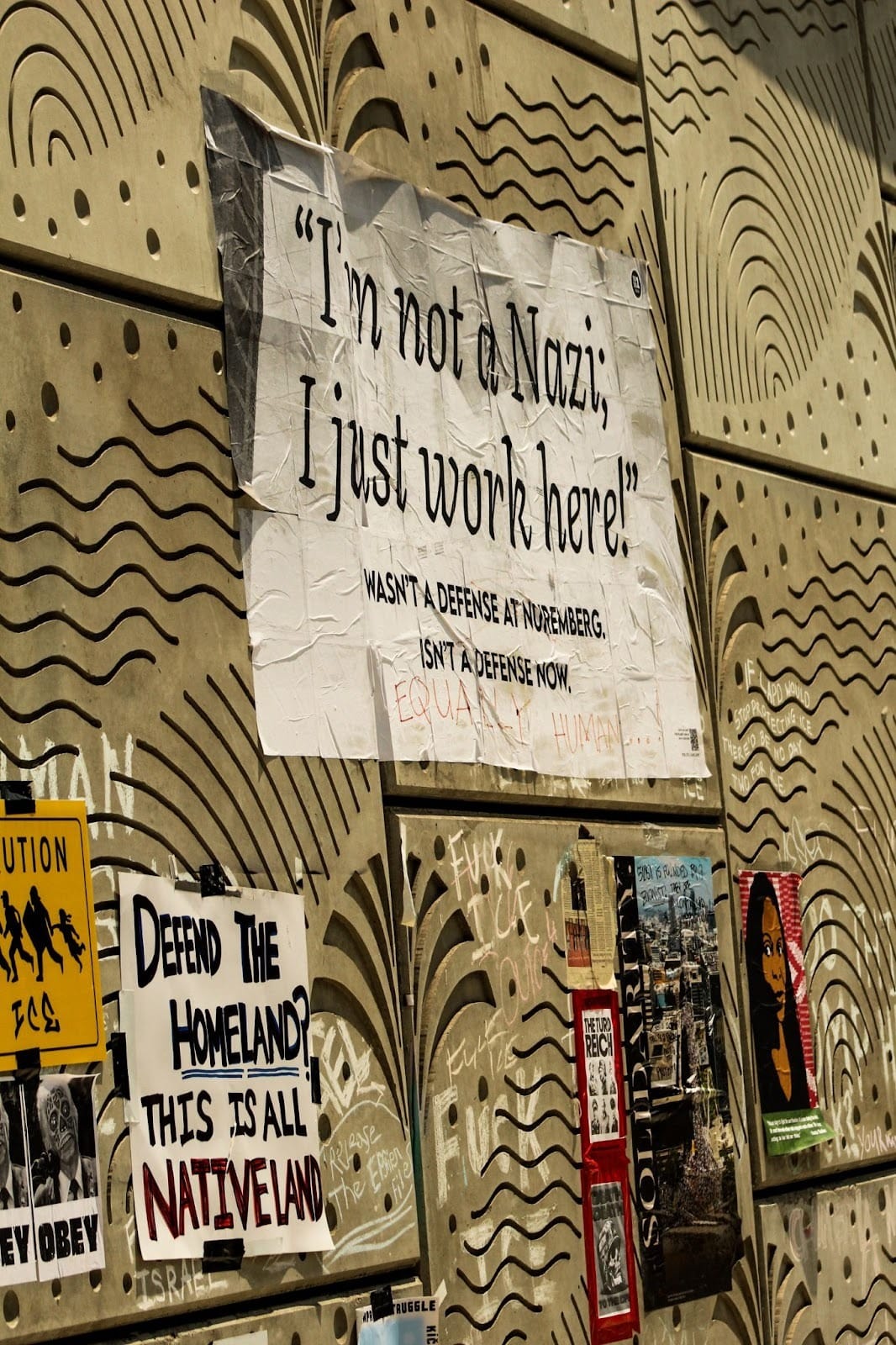
“[Fascism] doesn’t just mean ‘meanies that do things I don’t like,’” one person chastised me in reply to that street art photo.
Uh oh.
On November 3rd, I posted Scenes from the Dodgers World Series Parade, or, absurdities of living in a police state. It included these:
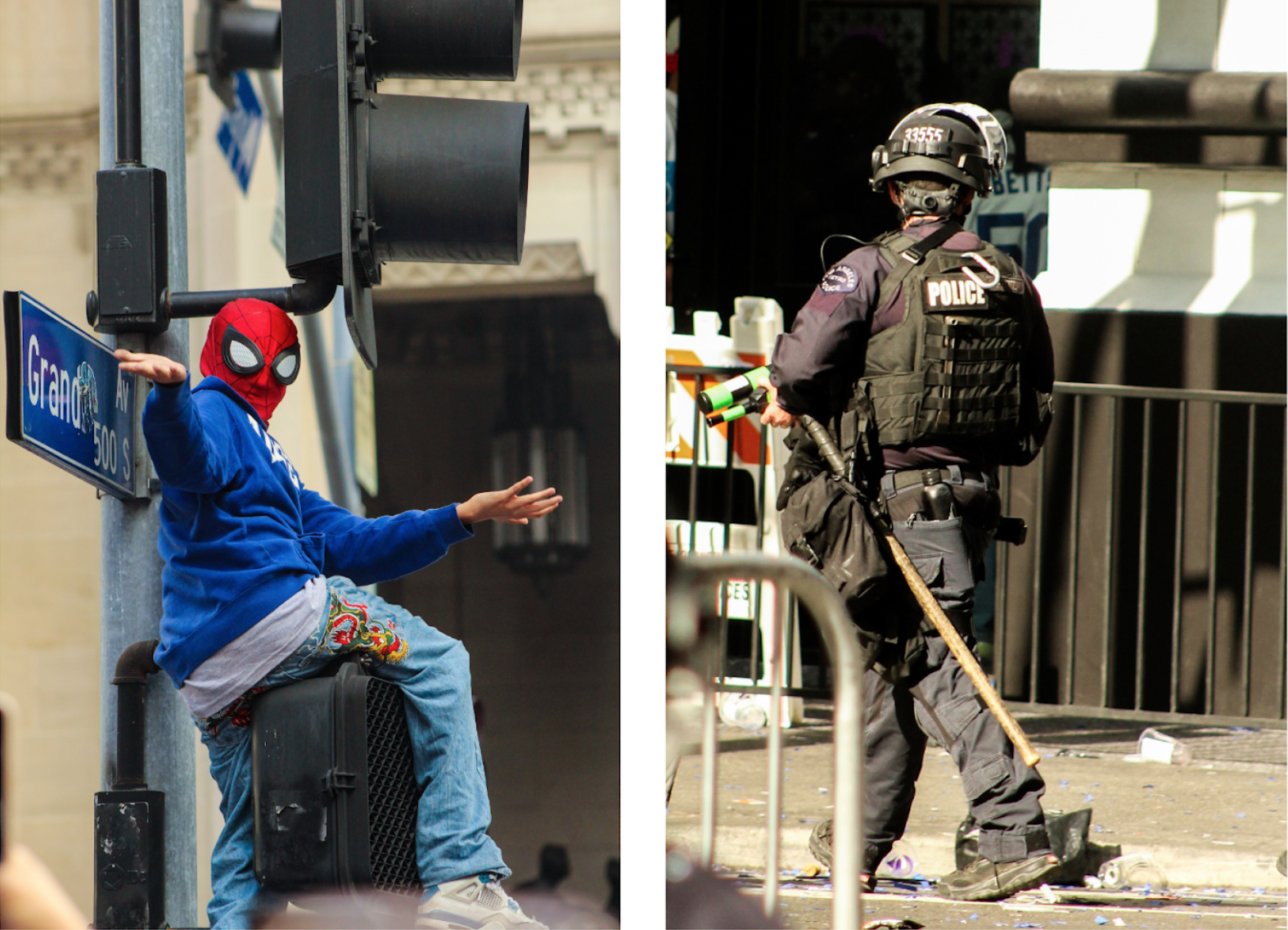
I assumed we’d all agree that we live in a police state. This is LA! Rodney King, anyone? We’ve faced the USMC, CBP, DHS, LASD, ICE, CHP, FPS, LAPD, and more in the last few months. Besides, I’m sure we all saw the word “absurdities” in the title, so we understand that we’re just having a little fun with silly juxtapositions like “Spider-Man in JNCOs” next to “cop with wooden sword,” right?
Everyone rushed to tell me that my photos didn’t show police brutality, so actually it’s “normal and accepted” for there to be this many cops at a large event. Was this my first time going outside? Don’t I know that sports riots are dangerous? I’m just fearmongering.
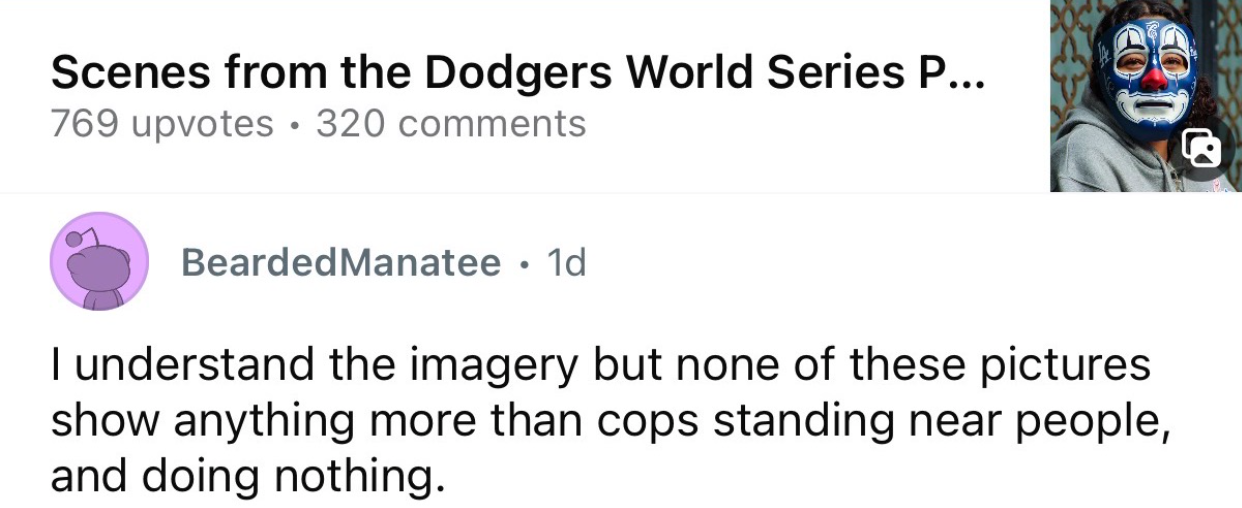
It’s not a police state, it’s just “cops standing near people.”
Fascism doesn’t just mean “people doing their jobs.”
For all we know, it’s a woman taking a picture of a van.
I feel like a doctor trying to tell someone they have cancer, only for them to reply, “Well, cancer is just cells, and I already know my body has cells, so what’s your point?”
It’s a deep societal denial, and I don’t just mean a denial of the reality we find ourselves in; I mean a denial of the existence of any shared reality at all. Words are just words, and images? Forget it. How can we expect people to find meaning in “person seeing vehicle” or “guy standing near building?”
Reddit made it click for me, but lest you think I’m spiraling over three dumb Reddit comments (there were many, many more) – I can point this out to you everywhere. I’m convinced we have Nazis again because this Internet-brainrot discourse style escaped into the real world.
Everything is six-seven, Dictionary.com’s 2025 Word of the Year, which is evidently uproariously funny to #TheYouth because it doesn’t mean anything. The kids are realizing that really, words are just mouth-sounds we repeat because other people repeat them.
It’s why they praise Charlie Kirk because he “debated.” It’s why they say he was killed “for his beliefs,” but are outraged if you suggest “the free speech that he spoke” had material effects on other people. You can lose your job for acknowledging that his words meant things.
It’s why all the uniforms seem like they say “POLICE” now, ever-present letters that may as well just be random shapes for all they tell us about which armed faction the guy tear-gassing you belongs to.
It’s why United Airlines can claim in court that selling a “window seat” “cannot reasonably be interpreted as” promising a seat next to a window. They’re right, just not how they mean it: no one can expect anyone to “reasonably interpret” anything. Sure: “window” means “wall” now. Fine.

It’s why United States Press Secretary Karoline Leavitt says – faced with emails that contain the credible suggestion that Vladimir Putin has sexual-assault-related blackmail on the President of the United States – that “These emails prove absolutely nothing, other than the fact that President Trump did nothing wrong.” She’s exploiting the fact that we no longer have a shared understanding of what we mean by “these emails,” “prove,” “nothing,” “fact,” and “wrong.”
How do we counteract that? “That depends on what the definition of ‘is’ is,” Bill Clinton famously said in 1998, and he was roundly mocked for it. That feels like every exchange now. In three sentences, we’ve gone from “Did the President sexually assault children?” to “Well, what’s your opinion of what the word ‘prove’ means?”
There is no true or false now, no right or wrong; there’s only the rhetorical advantage you gain by deploying certain mouth-sounds, whether or not you want them to represent any essential truth as we used to agree to understand it. It’s better if you don’t, actually. If you do, people get suspicious. Hey, are you AI? How else would you know how to use an em-dash?
That “agreeing to understand things” part is how “communication” has always worked, ever since we collectively decided that a stick figure bull on a cave wall could represent migration patterns. We couldn’t organize ourselves to modern society until we collectively agreed that colors could be emotions, and a spiral might indicate the sun, and sounds could be represented by letters, which could tell us what sounds to make to form words that have meaning. That innate trust in each other’s ability to represent things is how we passed on knowledge, how we evolved, how we spoke, how we wrote, how we invented, how we progressed, how we made art.
If things are falling apart societally on a level that fundamental? …Uh oh.
In conclusion: interpret this.
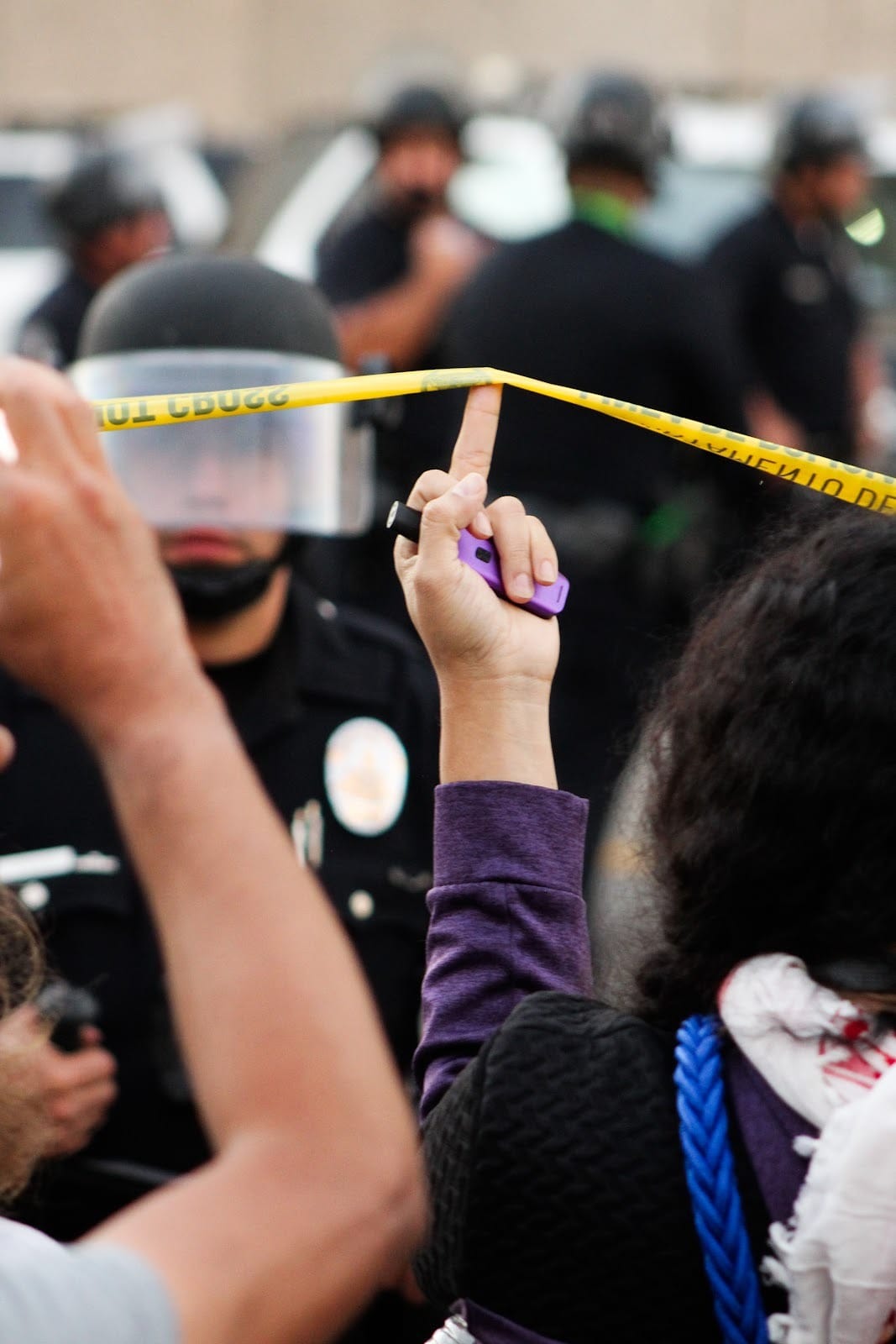
You can see more of Eric Langberg's work here, or on Instagram.

